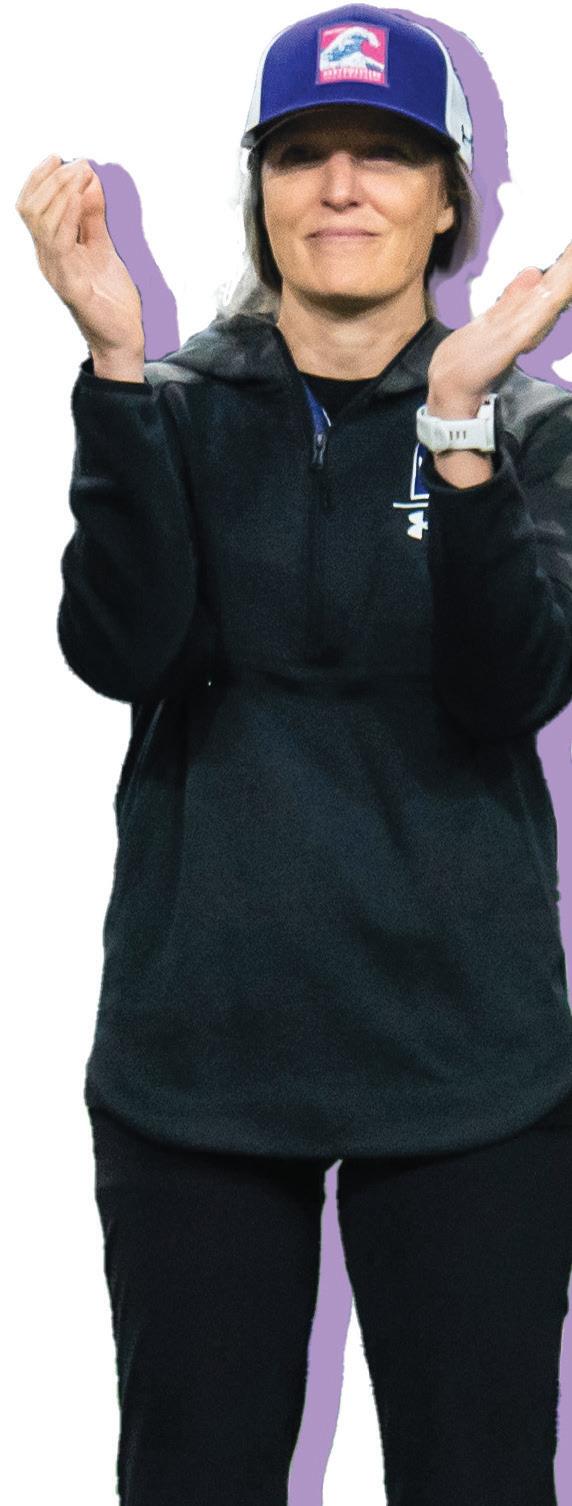The Daily Northwestern
8 SPORTS/Lacrosse
Kelly Amonte Hiller recruits into new era


8 SPORTS/Lacrosse
Kelly Amonte Hiller recruits into new era

CRDJ explores intersection of race, disability
By LEAH SCHROEDER daily senior staffer @lmschroeder_A er noticing a gap in the academic work on racial and disability justice at the Pritzker School of Law, Pritzker Prof. Jamelia Morgan set out to create a space to promote research on the intersection of racial and disability justice, she said. at’s how Pritzker’s Center for Racial and Disability Justice was born. Opened in Fall Quarter 2022, the center aims to create a more equitable society for people of color and people with disabilities, according to Morgan, who serves as the center’s faculty director.
“It was very important to have (this center) because many of the most pressing issues of our day are issues that implicate the rights, the experiences, harms against people with disabilities, people of color and people at the intersection,” Morgan said.
Morgan said it’s important for law schools to think about how to best mitigate racism and ableism when considering
new policies.
e ultimate goal of CRDJ is to prevent racism and ableism from impacting people on a daily basis, especially disabled people of color, she added.
“We have to be thinking about race and disability, and speci cally the forms of racial and disability discrimination, to be able to respond to redress a number of social justice concerns more broadly,” Morgan said.
CRDJ aims to accomplish its mission by utilizing empirical research to analyze and address social issues relating to racial and disability justice, empower advocates with lived experiences and share writing to reframe the perception of racial and disability justice in the media, according to its website.
To reach a wider audience, CRDJ has hosted public events at Pritzker’s Chicago campus and online to educate people and foster dialogue about the racial disability justice issues that the organization stands for.
“We want to be a resource for the community to learn to get support and to importantly connect with others that
» See CRDJ, page 6
AUDIO/NU Declassi ed
Organic chemistry Prof. Mark Aparece talks teaching journey
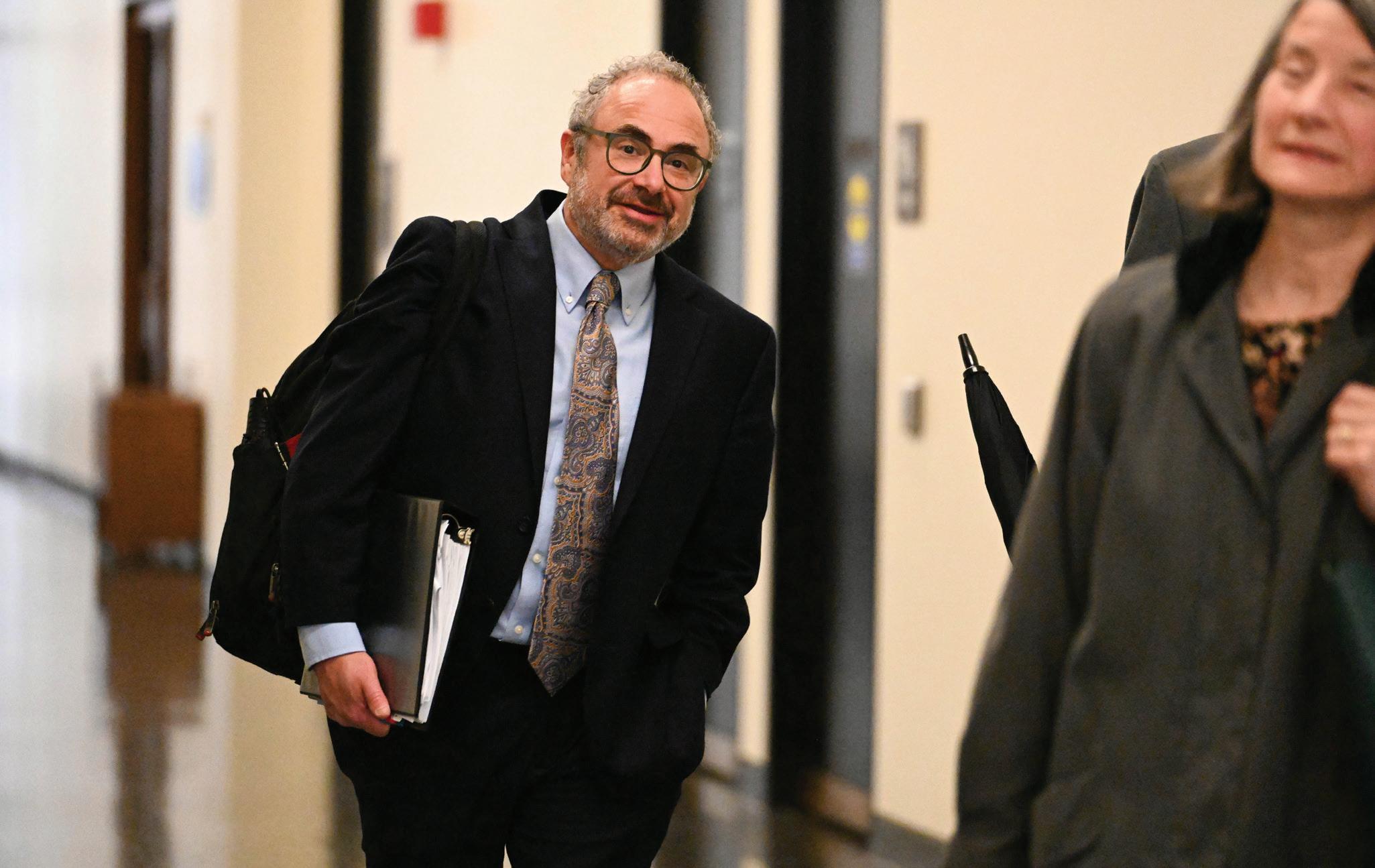
Finishing o the initial salvo in a wide-ranging lawsuit over
Ryan Field’s transformation into a part-time concert venue, a orneys for Evanston and Northwestern faced o in a Chicago courtroom Wednesday against lawyers for a group of residents opposing the controversial
New group aims for be er wages, working conditions, ‘seat at the table’By LEAH SCHROEDER daily senior staffer @lmschroeder_
According to postdoctoral research fellow George Winstone, all postdoctoral students can agree on one thing: eir need for a union. A team of Northwestern postdocs are creating just that.
Born out of January 2023 conversations, the NU Postdoctoral Union is working toward be er salaries and conditions for postdoctoral workers.
In the past, the University has not typically recognized organizations as unions until an election veri es majority support.
“Every single postdoc that I’ve interacted with has agreed that there is a need for something like a union to exist,” Winstone said.
NU’s postdoctoral union joins a league of others across the country, re ecting a growing trend of postdoctoral unions forming to demand be er conditions.
e main goal is to negotiate with the University for be er wages and working conditions, the organizing members said.
“A big motivating force is to balance the power dynamic in academia,” postdoctoral researcher Jacob Mann said. “In the current model, we can advocate for ourselves as much as we want, but without that legal power that we can achieve through a union, it still is ultimately up to the University.”


Mann said future union members hope to gain a “seat at the table” where they have bargaining power with the University.
Another major aim for the future union is to achieve be er salaries. Postdocs at NU are currently paid a minimum salary of $56,484. Without competitive pay, NU loses postdocs to other careers or schools
with be er pay, according to postdoctoral fellow Neto Canton.
“We don’t feel we’re fairly compensated for our expertise and for our work as postdocs,” Canton said. “Without having a union, we don’t think we can advocate for
»
project. Filed in November against the city, the civil complaint argues that Evanston’s narrow approval of the Rebuild Ryan Field project should be declared invalid.
Since then, NU, which was not named in the lawsuit, has led to intervene. Alongside the city, it asked the court to dismiss three of the four counts
» See HEARING , page 6
About 200 Evanston/Skokie School District 65 community members a ended a welcome reception for newly appointed Superintendent Angel Turner at the Joseph E. Hill Education Center Tuesday evening.
Turner was named District 65’s interim superintendent last June a er former Superintendent Devon Horton took a new job at a Georgia school district. Prior to that, Turner was the district’s assistant superintendent of schools and director of literacy.
e District 65 Board of Education named Turner the district’s permanent superintendent at its March 18 meeting.
“Together, I am con dent that we can achieve great things and create a positive impact on the lives of our students, families and community,” Turner said at the
event.
e reception was a way for the community to get to know Turner on an informal level, according to Melissa Messinger, the district’s chief communications o cer. She said community leaders, partners, district staff and families were all in a endance.
Board President Sergio Hernandez called Turner a “powerful force” in the District 65 community during his remarks to a endees.
“She’s trying to humanize the work that we do as educators,” he said. “( is) is critical as we try to continue to transform our school system into the one of the most equitable and accessible school systems for all students in all families across Skokie and Evanston.”
Turner said she’s ready to “roll up sleeves” to increase e ciency and productivity in the district, with the goal of making District 65 the “premier” elementary and middle school district in the North Shore.
e reception featured Joseph
» See SUPERINTENDENT, page 6
e Woman’s Club of Evanston hosted its annual Dreams Delivered Prom Boutique from Sunday to Tuesday, out ing 120 Chicago area students with free prom dresses, shoes and accessories through a custom experience.
e Woman’s Club co-hosted the program with the Ivy Pearl Foundation, a philanthropic organization within the Delta Chi Omega chapter of Alpha Kappa Alpha Sorority, at the WCE Clubhouse. e boutique has out ed prom-goers for the past 17 years, instituting a legacy of service and empowerment in the Evanston community.
At the boutique, WCE volunteers assist students to nd the perfect prom dress with matching accessories. Students from the Tricoci University of Beauty Culture also o ered hair and makeup guidance to complement the students’ out ts. Tailors were also on-site to provide alterations.
Many of the event’s 104 volunteers, including WCE President Caitlin Cody, cited the students’ con dence in their prom transformation as the most magical part of the boutique experience.
“You see their posture change, you see their facial expression change,” Cody said. “ ere’s something special about feeling beautiful and feeling like an adult.”
WCE member Moyenda Knapp founded Dreams Delivered in 2007 a er she and school administrators identi ed the need for greater accessibility to formal prom a ire at Evanston Township High School.

Her favorite part of the event is helping students go to prom despite nancial or time constraints, she said.
“I hope the community gets out of this event knowing that there are people out there who will support others,” she said.
Knapp said a student’s grandmother asked if she needed to return the dress a er the rst Prom Boutique. Being able to tell her the dress was her
granddaughter’s was “so moving,” Knapp said. Dreams Delivered has evolved from a needbased, ETHS-focused event to serve a growing number of students from diverse backgrounds. Organizers promote inclusivity as an event tenet.
“We do not have any restrictions by gender (or) gender identity,” event chairperson Erin Booker said. “We don’t restrict by income or, right
now, geographical location … It’s open to pre y much anyone who wants a dress.”
e boutique’s stock of about 1,000 dresses, ranging from size 0 to 26, comes from local business and family donations collected at 10 Chicago-area drop-o sites. e Women’s Club also raises money to buy additional dresses and shoes to complete the selection.
Evanston mom and Dreams Delivered member Kelly Terrell said the community connection aspect of Dreams Delivered enhanced her boutique experience with her youngest daughter, who a ended this year’s event.
“The dress that she ultimately picked … was donated by someone that I know,” Terrell said. “It was actually one of her wedding dresses. And so having all the layers of emotion, it’s pretty exciting.”
For ETHS senior Ela Altay, who a ended the boutique and promoted it at ETHS’ Senior Assembly in March, trying on prom dresses with friends was an iconic high school experience. Altay said the event showed her the power of support and solidarity among women.
“It ended up being such a teenage comingof-age movie moment … of all the girls in these beautiful dresses,” Altay said.
WCE volunteer and future co-chair of the event Kathy Hayes said she hopes the boutique instills students with a sense of service to the community.
“ is is all about giving forward,” Hayes said. “We want students and youth to know that there’s stu out here that you can do that gives a smile on your face by the end of the day.”
marisaguerraecheverria2027@u.northwestern.edu
e Illinois Senate unanimously passed a bill on Friday mandating that all state transportation agencies issue an annual report on recommendations from the National Transportation Safety Board and their implementation status.
State Sen. Mike Simmons (D-Chicago) introduced Senate Bill 3451 after a Chicago Transit Authority Yellow Line crash near Howard station in November. The accident hospitalized 16 people and closed the line for nearly two months.




The bill would require the CTA, Metra, Regional Transportation Authority and Illinois Department of Transportation to release their reports to the public by Dec. 31 each year.
In a Friday news release, Simmons said the bill is a way to help passengers feel safe during their travels. He said this safety relies on con dence that the system they are riding runs safely and smoothly.
“Rail accidents can be prevented if our rail transit systems are regularly implementing federal safety recommendations and keeping those up to date and viewable to the riding public,” Simmons said in the news release.
The bill is now in the Illinois House for deliberation.

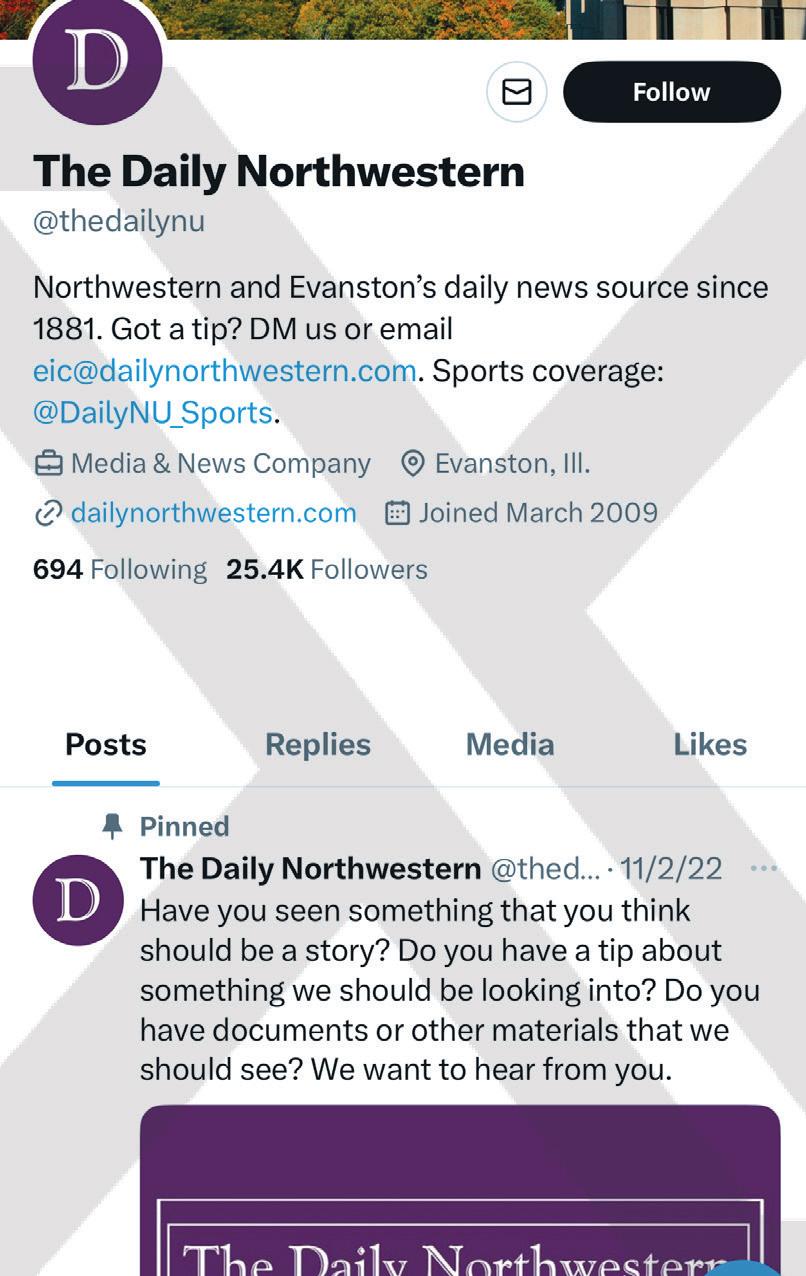

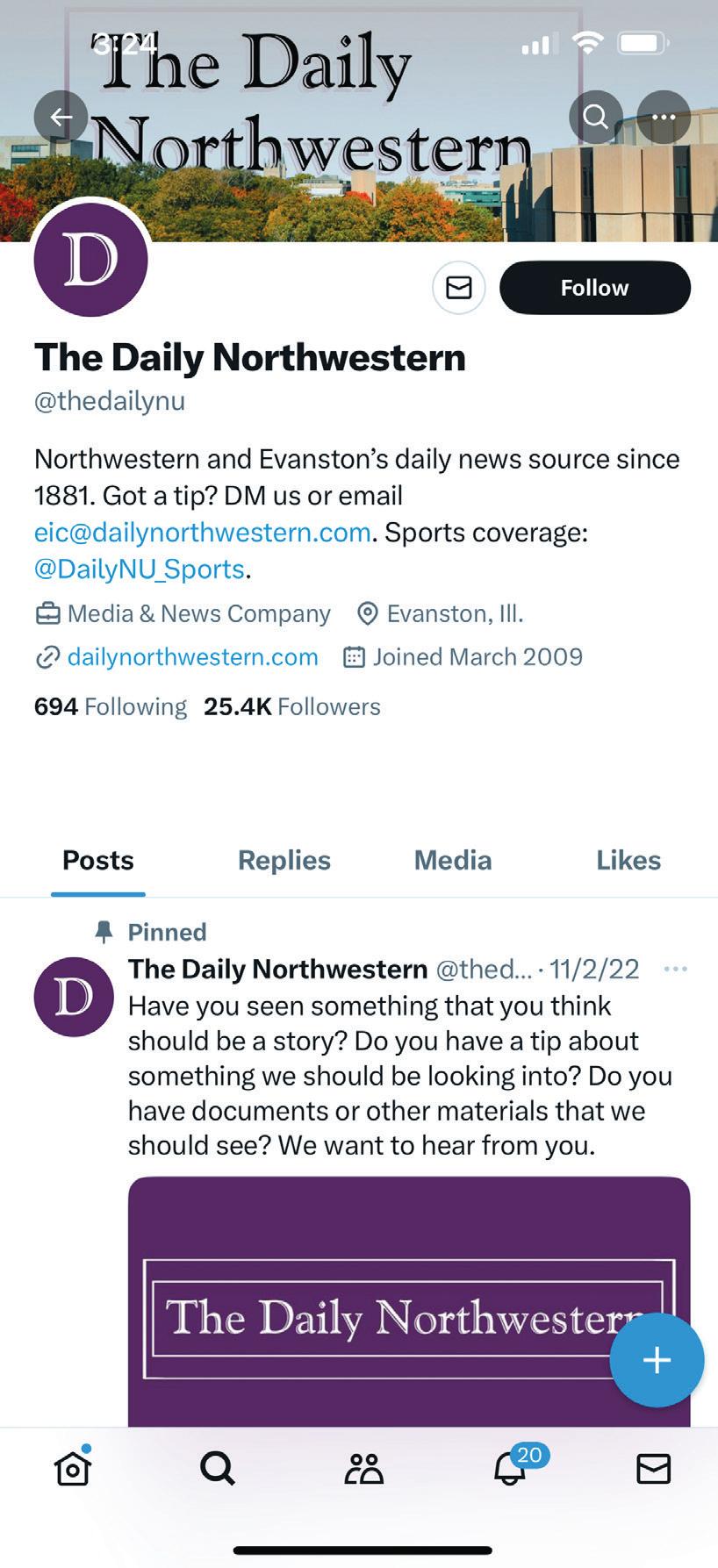

Content warning: is article contains mentions of sexual assault.
A er a ending an event Communication sophomore Rose Hunskor hosted about the intersection of Greek life and sexual violence, Medill sophomore Shravya Pant said she felt compelled to join the cause. e two sorority members joined forces, and Survivor Advocacy through Greek Engagement was born.
“I had been motivated by things that I had seen and heard across our Greek life community,” Hunskor said. “I de nitely thought that there needed to be a culture change to address what’s been the norm for a very long time as it relates to rape culture.”
SAGE is an organization that advocates against and provides resources to prevent sexual violence in Greek life. e club held its rst meeting in Fall Quarter.
Hunskor, a member of Delta Gamma, and Pant, a member of Delta Delta Delta, spent last summer planning and discussing their new organization, as well as reaching out to representatives from Greek life chapters and organizations and the Center for Awareness, Response and Education.
“When we had our rst meeting, it was so enlightening because we had a bunch of people across both fraternities and sororities come and share ideas or concerns that Rose and I hadn’t even considered before,” Pant said. e mission of the group is to “empower survivors, foster allyship and a culture of consent and promote a violence-free Greek life experience for all.” e organization works to promote discussions of sexual violence in Greek life and create discussion materials for Sorority and Fraternity executives to utilize during chapter meetings to broach topics of sexual assault.
“Having engaging conversations where people feel that they’re safe to say that they’re confused or they don’t understand or they don’t know what to do helps people to feel like they know more, and they can do something in a situation,” Hunskor said. “ ey have the proper tools and are empowered to support
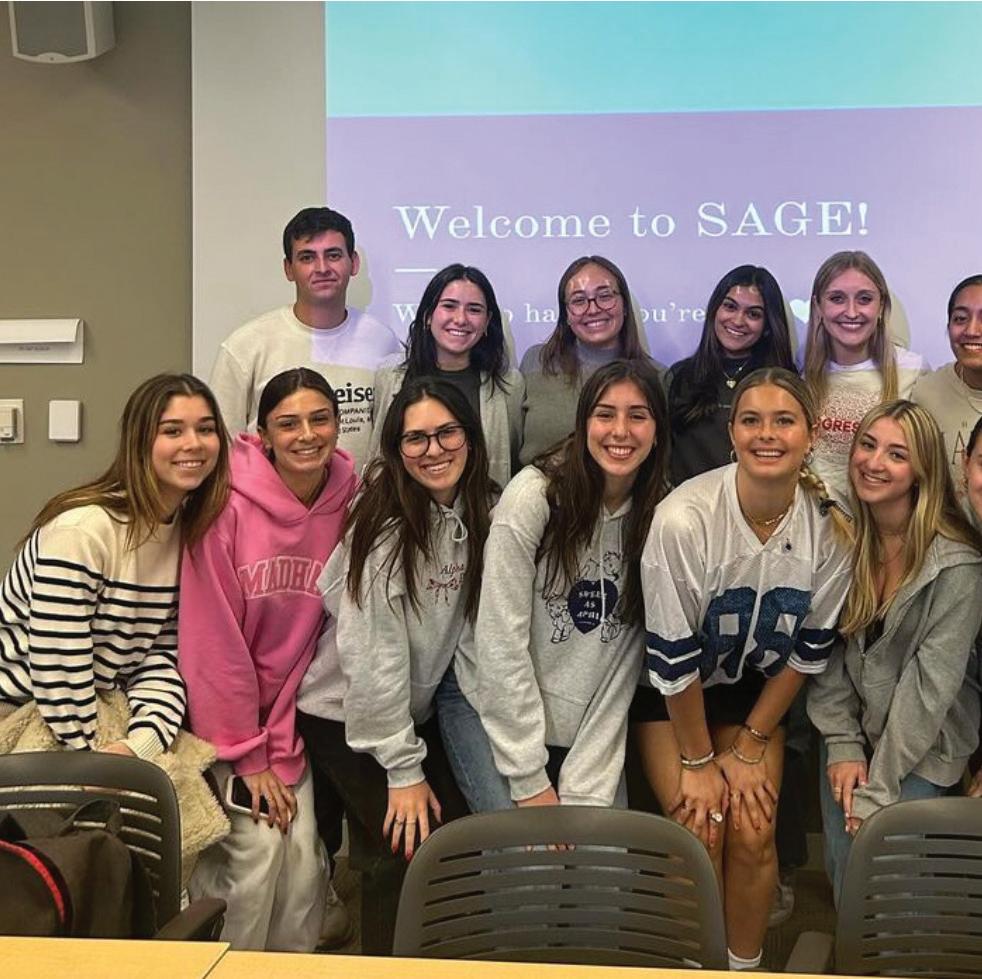
survivors and have survivor-centered conversations.”
Weinberg sophomore and Alpha Phi President Avery Franks is a SAGE member.
Franks said the main reason she joined is to be a part of conversations about sexual assault, listen to members’ experiences and learn how to create a safer community.
“It’s really important for me that our members understand the risks associated with being a part of a Greek chapter and that whenever they’re socializing with other chapters that they know how to be safe … so that they know where to go to seek help,” Franks said.
Some of the organization’s future goals include creating uniformity in the way that Greek organizations discuss sexual violence and increasing membership.
Pant said the group hopes to speci cally reach more male members of Greek life.
“A lot of the conversation does center around
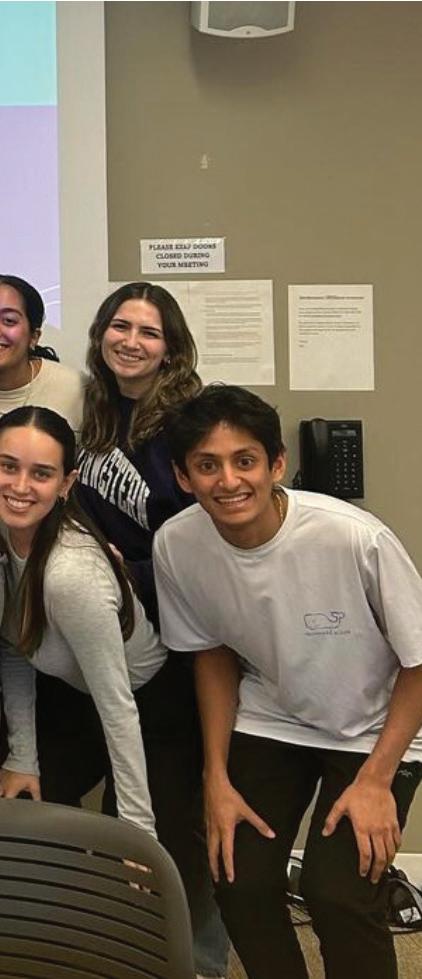
women,” Pant said. “Male engagement is something that we’ve de nitely talked about and are working on. We do have members of fraternities who are a part of SAGE and they’re so awesome and contribute a lot.”
e founders said they aimed to cultivate a group that was low-commitment so members didn’t feel like they had to a end every single meeting.
Pant said “there is much to be gained” in participating in Greek life that can be formative to the college experience, such as creating friendships and being in fun environments.
“
ere are also inherent aws in the system,” Pant said. “Making people more comfortable understanding how that relates to some of the incidents of violence that we see is something that I hope that can be a result of our discussions and work.”
leahschroeder2026@u.northwestern.edu









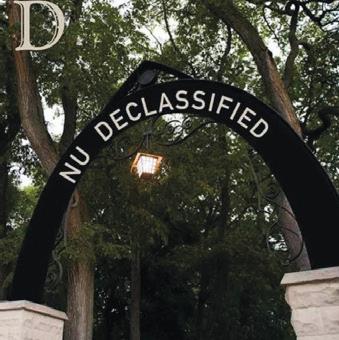















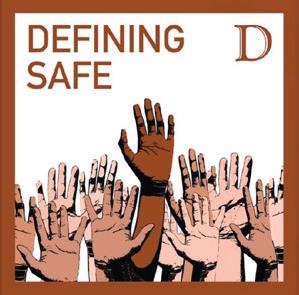





















































































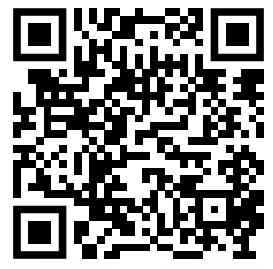







ELI
Between mid-November and early February, The Daily Northwestern published four Le ers to the Editor about the Israel-Hamas war. eir authors were “70 student organizations,” “22 Northwestern Students,” “163 Northwestern faculty and sta ” and “65 student organizations.”
Neither of the pieces authored by a list of student organizations have a single individual’s name a ached to them. In the le ers wri en by a group of individuals, some who e Daily included in its count did not provide their name.
“Five anonymous students” signed on to an article titled “Anti-zionism is not antisemitism,” while “17 Anonymous faculty and sta members” was listed as an author in a le er criticizing President Michael Schill’s email announcing the formation of a commi ee on antisemitism and hate.
While some authors may have legitimate reasons for not wanting to be personally associated with those pieces, the indiscriminate authorization of anonymous Le ers to the Editor is an impractical policy that exacerbates an already unhealthy speech environment on campus.
Since there is no uniform process whereby a student organization can gain approval from its members to add the organization’s name to a letter, the club’s presence on the authors list provides li le insight into how representative the opinion is. It doesn’t even imply that a discussion or vote was held among the organization’s executive board.
e Daily included an editor’s note on one article authored by “70 student organizations” that called for students to boyco e Daily, clarifying that “at least one member of each executive or operating board signed this le er.” is suggests any rogue executive board member may add their club’s name to the list of authors to manufacture a fraudulent image of consensus.
e Daily has not even guaranteed that several of the organizations listed do not represent the
views of a single individual who holds executive positions in multiple clubs.
ese procedural gripes may seem pedantic, but they ma er because a careless process permits bad-faith actors to hijack the norms of civil discourse. Indeed, there is something far more insidious about op-eds that are wri en in packs and disassociated from individuals — rather than contributing productively to the marketplace of ideas, they discourage nuance and sti e the exchange of opposing views.
Most importantly, the pieces have no clear return address, making them more like petitions than op-eds. If someone wanted to ask the authors a question or follow up on a speci c argument, they would have a very di cult time doing so because the true authors’ identities are unclear.
While all Daily stories typically link to the writer’s email address below the article, there is no contact information associated with any of the four pieces at hand. If someone were to write an
e authors’ anonymity emboldens them to make in ammatory claims that they might rethink if they were personally accountable for what they wrote.
- ELI KRONENBERG ”article disputing the original le er’s claims, that would likely spell an end to the dialogue because no one is obliged to answer for the opinion.
e person who spearheaded the initial piece could write a response and gather the same group of signatories to back them up, but such a response would be devoid of the self-re ection required to address substantive disagreements because the alignment of dozens of people behind a single
political orthodoxy renders the discussion inherently combative. In a good free speech environment, the 70 or so people representing student organizations would all respond to criticisms di erently — some would adjust their views, while others would double down. Each of them likely had slightly di erent views in the rst place, but the consolidation behind a veil of anonymity removed the nuances that each voice would have brought to the table had they wri en separate articles. The authors’ anonymity emboldens them to make in ammatory claims that they might
Daily sta ers, we were told by a senior member of the paper that anonymous sources were prohibited barring extenuating circumstances.
It is di cult to square this policy with the routine publication of anonymous Le ers to the Editor, the last four of which have expressed opinions relating to the Israeli-Palestinian con ict that seem to be held by a non-trivial portion of the student body.
At the very least, e Daily owes its readers far more transparency. Each time an anonymous opinion is published, it should be accompanied with an explanation as to why the authors felt they could not publish their name, just as you would see alongside an anonymous quote in a news piece.

Over the weekend, I attended the Eid banquet hosted by Northwestern’s Muslim-cultural Students Association. An Eid meal occurs during the festival of Eid al-Fitr, which celebrates the end of the month of fasting in Islam. This month, the ninth in the Islamic lunar calendar, is known as Ramadan.
According to Islam, Ramadan is when the first verses of the Quran, the holy book of Islam, were revealed to the Prophet Muhammad. During a Ramadan fast, abstinence from food and water takes place from dawn to sunset, when the fast is broken in a meal known as “iftar” in Arabic. The act of fasting for Muslims is one of worship, as well as one of empathy, drawing the individual closer to those suffering.
It is not surprising, then, that at the banquet, while families and friends congregated, there was a note of melancholy in the atmosphere, a collective pensiveness. Last month, CNN published a photograph showing a Palestinian family in northern Gaza breaking their Ramadan fast among the bombed rubble of their home.
In India, where Muslims make up 14.2% of the country’s population, Prime Minister Narendra Modi has become an emblem of the right-wing’s anti-Muslim mentality. Since his initial election in 2014, Modi has pushed Muslims into the category of second-class citizens. Most recently, he passed the Citizenship Amendment Act, a law facilitating the acquisition of citizenship for migrants of Hindu, Parsi, Sikh, Buddhist, Jain and Christian faith — but excluding Muslims.
Now, Modi is gearing up for what is predicted to be a landslide victory in the upcoming general election. This election, taking place between April 19 and June 1, will be the largest in human history, as an estimated 960 million people will give in their slip of choice.
But Modi has not been playing fair. Not only
did he recently order an arrest on Arvind Kejriwal, the leader of the Aam Aadmi Party and Modi’s main opposition, but he has also been editing the political narrative for years.
Modi is especially notorious for bullying X (formerly known as Twitter) executives into complying with his censorship requests. Among these was the demand that accounts and tweets promoting Hindu-Muslim unity be blocked.
In October of 2023, X blocked the accounts of Hindus for Human Rights and the Indian American Muslim Council — both of which were advocating for a peaceful and secular future for India that grated against Modi’s desire for an all-Hindu nation.
I am an Overseas Citizen of India and a citizen of France and thus cannot vote in the upcoming election. It is a strange feeling to belong to a country, to have grown up in a country and to have seen its vitality — its secular vibrancy — shrivel under the reign of Narendra Modi and the Bharatiya Janata Party. To know its contours and its climate but to not turn in my ballot, to not be able to act against Modi’s disrespect towards India’s rich secularism and democracy, is painful.
India’s right wing has tried, for a very long time, to validate its hatred of Muslim people. Its leaders reason that the Mughal rulers in India were brutal and that India’s Muslim communities must bear punishment on their behalf.
However, Manu Pillai, an Indian historian, highlights that Hindu kings were just as violent as Mughal emperors, and that violence was a feature — albeit an unethical one — of nearly all ancient kingdoms, where ethics were not conceived. But these facts seem to gain no traction in post-truth India, as the government’s penchant for editing citizens’ knowledge begins at the level of adolescence.
In June 2022, India’s National Council of Educational Research and Training removed the reasons for Mohandas Karamchand Gandhi’s assassination from history and political science textbooks for high schoolers. Gandhi was assassinated by Nathuram Vinayak Godse, a Hindu extremist, on January 30, 1948. Godse was affiliated with the Rashtriya Swayamsevak Sangh (RSS), a group that promotes the
e op-ed page of a newspaper is one of the few mediums le in the public sphere that can be governed to ensure civil dialogue.
- ELI KRONENBERG ”rethink if they were personally accountable for what they wrote. It is this safety in anonymity that has empowered countless social media trolls and turned websites like X, formerly Twi er, into safe havens for vitriolic bigotry.
is same logic underpins the recent decisions of protesters across the country to wear masks and block the lming of demonstrations in order to conceal their identities.
e op-ed page of a newspaper is one of the few mediums le in the public sphere that can be governed to ensure civil dialogue. Journalists should do everything in their power to preserve the sanctity of that space.
at is not to say that there is no circumstance under which a piece could be published anonymously. However, e Daily is clear that there is typically a high bar for making such a judgment. When I a ended a training session for prospective
When the New York Times decided to publish a single anonymous op-ed in 2018, it le a note atop the article calling it a “rare step” and explaining its decision. Pre-empting the backlash that might come with such a diversion from its established journalistic practices, e Times invited readers to submit questions about its ve ing process and had then-Op-Ed editor James Dao respond to the queries in a separate article.
At a premier journalism school where students are forced to grapple with journalistic ethics from their very rst quarter on campus, the least we can expect is a transparent justi cation of editorial decisions that would be viewed as extraordinary in professional journalism.
I strongly urge e Daily to reconsider its policies regarding the publication of anonymous Letters to the Editor — especially those signed by student organizations — and to outline clear and public standards for granting anonymity.
Eli Kronenberg is a Medill freshman. He can be contacted at elikronenberg2027@u.northwestern.edu. If you would like to respond publicly to this op-ed, send a Letter to the Editor to opinion@dailynorthwestern.com. The views expressed in this piece do not necessarily reflect the views of all staff members of The Daily Northwestern.
idea of Hindutva — a nation ruled by a Hindu majority.
At the time, Gandhi was the nation’s fiercest advocate for Hindu-Muslim unity. This is one of a series of deletions made by the organization and uploaded to its website.
These deletions showed the stain of saffronisation, a political neologism that finds its origins in the saffron-orange robes worn by certain Hindu priests and refers to the rightwing policies that censor art and culture. They repeatedly targeted facts on Mughal India, its secularism and Hindu extremism.
Included in the collection were the 2002 Gujarat riots which Narendra Modi allegedly facilitated, an allegation that led him to be banned from the United States until his election to the position of prime minister in 2014.
”
e next generation’s ght for truth will be slowed by their own edited knowledge.
- DEVAKI JAYAL
Frantz Fanon’s “The Wretched of the Earth” offers the view that, by reveling in violence, a post-colonial nation refuses colonialism, rejects its historical subservience and claims its freedom. In this case, a Hindutva nation excludes its innocent Muslim citizens as it wishes to exclude the memory of the British Raj. But, in pursuing its political project of Hindutva, the right also fulfills the vision of India that Britain first set out to achieve — of a divided nation.
Pakistani writer Saadat Hasan Manto once dreamed of an Indian subcontinent where “people will live as people, irrespective of religion.” But Modi’s smiling promises of better days seem different from the dream Manto envisioned. The next generation’s fight for truth will be slowed by their own edited knowledge.
But, I hope that in the coming weeks they will give in their ballots urged by the possible
imminence of a nightmare. Of the midnight hour coming and going. Of a day when India could awake, this time, into a ruined, mottled dawn.
Devaki Jayal is an exchange student from University College London. She can be contacted at devaki.jayal.24@u.northwestern.edu. If you would like to respond publicly to this op-ed, send a Letter to the Editor to
Students filled donation bins in Main Library and Sargent Hall that were dropped off Saturday as part of a spring clothing drive held by the Korean American Student Association and Evanston nonprofit Connections for the Homeless.
Connections provides shelter and resources to those who are homeless or at risk of homelessness in Evanston. KASA members donated four bins of new undergarments, pants, tops and sneakers to Connections from the drive and private donations.
KASA has previously held events with several nonprofits, including volunteering with the AKP Sports Foundation to help run a Korean American Soccer Tournament, catered toward the Korean American community. Medill sophomore Rie Kim, KASA’s co-outreach chair, said the organization recently shifted its focus to also include initiatives that benefit the wider Evanston community.
“It’s really easy to get caught up in the Northwestern bubble,” Rie Kim said. “As outreach chairs, we’re always trying to see how we can get out of that bubble and serve the greater
Chosen from a pool of nearly 3,000 applicants, Northwestern faculty made up six of 188 Guggenheim Fellows in 2024, the University announced Tuesday.
Joining the competitive group of fellows named by the John Simon Guggenheim Memorial Foundation are art, theory and practice Prof. Mike Cloud, neurobiology Prof. Nina Kraus, chemistry Prof. Chad Mirkin, chemistry Prof. Teri Odom, art history Prof. Krista Thompson and McCormick Prof. Petia Vlahovska. Through a rigorous process, applicants demonstrated impressive career achievement and future promise, according to the University press release. Fellows across 52 disciplines will receive a financial
Korean Chicagoland community.”
Rie Kim said given NU’s presence in Evanston, KASA chose to donate to Connections to give back to their local community.
The organization chose to hold the clothing drive during Spring Quarter because people often associate spring with cleaning and decluttering, Rie Kim said. As students move out of Evanston, they may want to make some donations before packing, she added.
Weinberg senior Christine Kim said she grabbed the chance to donate shirts and sweaters because she had been thinking of donating some of her clothes but did not know where or how to in Evanston.
“As a senior, I’m planning to move out in a couple of months and have a lot of clothes just sitting in my closet from the last four years of college, so I thought it’d be a good opportunity for me,” Christine Kim said.
Weinberg freshman and junior executive outreach member Namoo Hyun said KASA is aiming to serve all communities beyond the Korean American students on campus and is “giving back to communities that might not have the privilege that people at Northwestern have.”
The organization hopes to continue including other groups into their projects to spread mutual understanding and empathy through cultural programming, he added.
stipend to pursue their work at the highest level possible.
Mike Cloud: Cloud is an associate professor of art, theory and practice, as well as a practiced painter. In his work, Cloud focuses on both painting and imagemaking, exploring form, text and re-aligning content to produce new understandings. Cloud plans to use his award to work on “Holistic Abstraction,” a research, writing and painting endeavor.
Nina Kraus: Kraus is a neurobiology and otolaryngology professor, the Hugh Knowles Chair of communication sciences and disorders and the director of the “Brainvolts” lab. Kraus’ research focuses on the biology of auditory learning, seeking to show how our lives in sound impact our neurological health, affecting our brain and interactions with others. With the Guggenheim fellowship, Kraus plans to write a novel exploring what music can teach us about our biology.
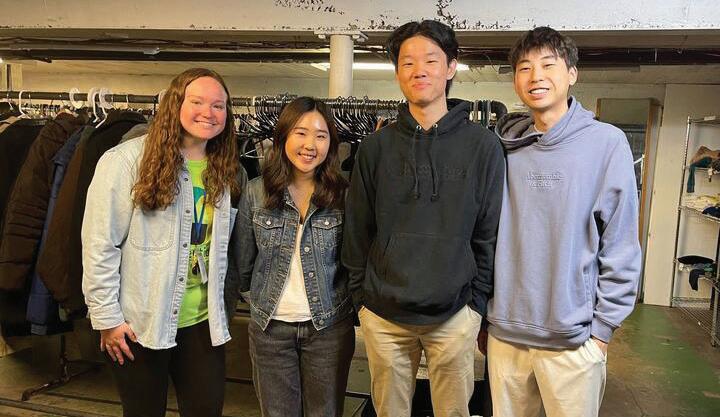
“It’s also an opportunity for us to spread diverse perspectives, which in turn actually would benefit the greater Northwestern community as a whole,” Hyun said.
In May, KASA will host Culture Week to promote and offer students a chance to “dive
Chad Mirkin: Mirkin is a chemist and nanoscience expert. He is the director of the International Institute for Nanotechnology and the George B. Rathmann Professor of Chemistry. Mirkin has authored 870 manuscripts and 1,200 patent applications, founded multiple companies and served on the President’s Council of Advisors on Science and Technology for eight years. With the award, Mirkin plans on conducting research to transform cancer vaccines with nanotechnology.
Teri Odom: Odom is the Joan Husting Madden and William H. Madden Jr. Professor of Chemistry and the chair of the department of chemistry. He is also a member of the International Institute for Nanotechnology and Chemistry of Life Processes Institute. She designs structured nanoscale materials and hopes to use her fellowship to create structured color materials, which can be used for nanoscale coatings on cooling surfaces.
into Korean culture,” Hyun said. “As students, we have so much that we can bring to the greater community and the spaces that we’re in,” Rie Kim said.
kelleylu2027@u.northwestern.edu
Krista Thompson: Thompson is an art historian, curator and the Mary Jane Crowe Professor in Art History. Thompson researches the art of the African diaspora and Caribbean, especially photographic art. She has written several novels and plans to write another with her stipend, featuring 1960s African American artist Tom Lloyd.
Petia Vlahovska: Vlahovska is a professor and director of the Complex Fluids and Soft Interfaces Lab and is renowned for being the first in her field to examine the dynamics of “microrotors,” dense suspensions of self-propelled, tiny rotating spheres. Vlahovska plans to use her stipend to work toward harnessing active fluids for engineering micro-robotic systems.
Leah Schroeder


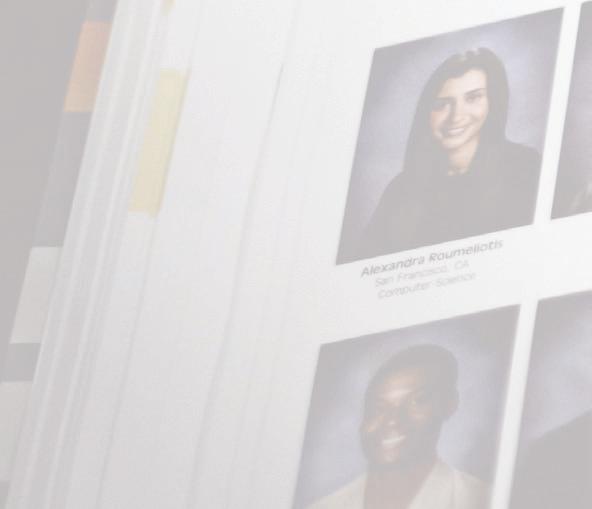

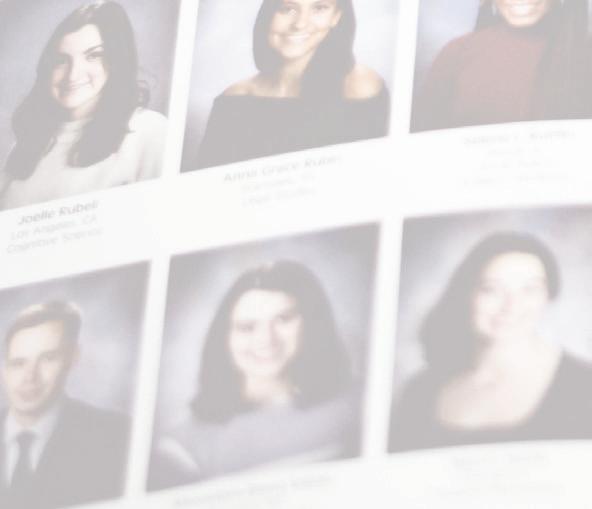


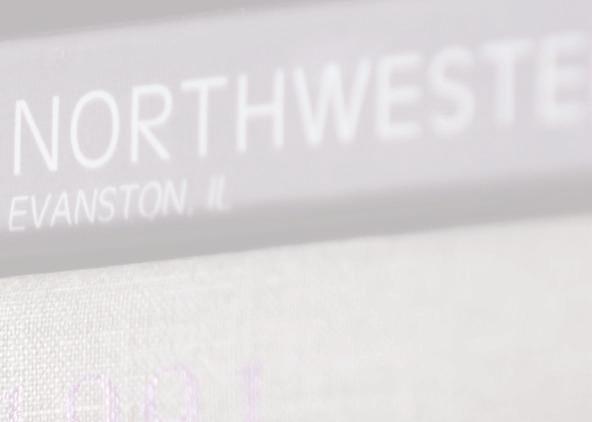
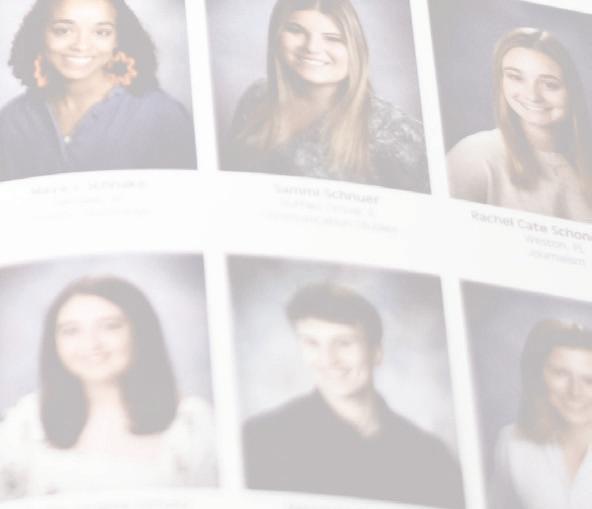

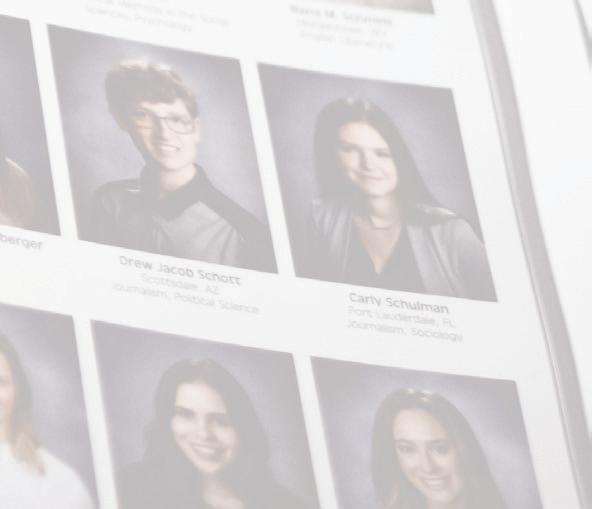



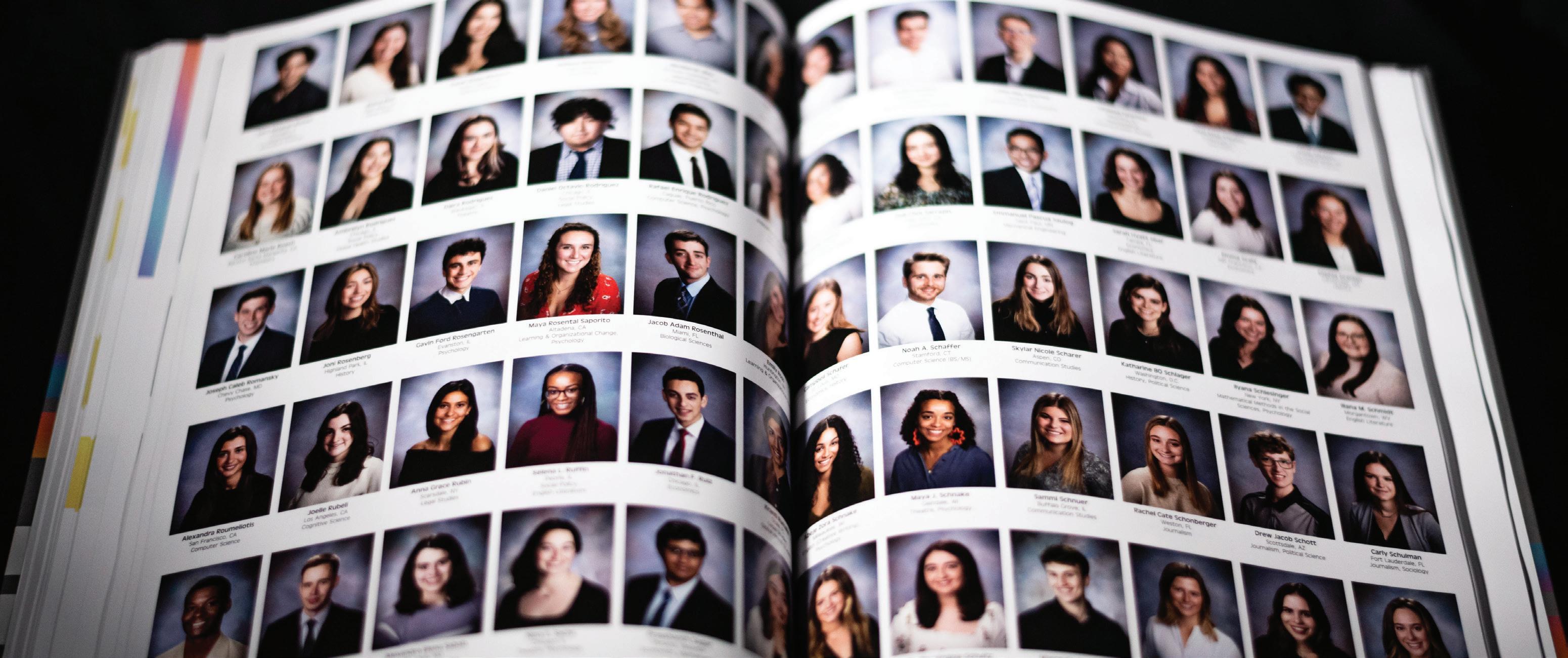


From page 1
E. Hill Early Childhood Center students’ art and performances by Chute Middle School orchestra students and Dawes Elementary and Kingsley Elementary’s joint choir.
Ellen Johnson, a Dawes Elementary parent, said she was there to support her daughter, who is in the choir. She said she was happy Turner was named superintendent because continuity is important for the district.
“She’s been a part of the district in various roles over her career, (which) I think is a nice thing to have in a superintendent,” Johnson said. “I care a lot about equity in the school district and I know that she does too and will promote those values.”
From page 1
ourselves to maintain or receive a fair wage based on our expertise.”
While the union is in its early stages, members plan to continue with their outreach efforts.
Winstone said the future union is about more
From page 1
are working on these issues,” Morgan said.
For CRDJ Executive Director Jordyn Jensen, her work at the center is centered around emphasizing a phrase popular within the disability community, “nothing about us without us,” she said.
Jensen said she draws from her experience as someone who has multiple disabilities.
“What I’ve realized through my personal advocacy and throughout my work is that people with disabilities often are left out of conversations, left out of policymaking and research that is about them,” Jensen said. “If they’re not at the table, their voices are not being heard.”
Work at CRDJ fits into four program areas — promoting equity and justice under the law, addressing ableism and discrimination in caregiving, challenging status and social mobility and imagining a sustainable future.
Morgan said most issues seen in the news today, from crime to housing to education, are related to issues of racial and disability discrimination, which the center hopes to unite communities around.
Turner was chosen through a monthslong process involving various stakeholder surveys and rounds of interviews with candidates.
She comes into this role as District 65 is discussing the closure of the Dr. Bessie Rhodes School of Global Studies, building a new 5th Ward school and navigating a budget crisis.
“It just feels very wonderful to see the support from various community partners, from families, from parents, who really see what I see,” Hernandez told The Daily. “That’s a superintendent who is dedicated to ensuring that we’re building relationships, that we have transparency in the business that we do for the community.”
anaviprakash2027@u.northwestern.edu
than just a contract — it’s about mutual care.
“We come into work every day,” Winstone said. “We like to see the people around us happy and treated with respect and dignity. Establishing a union is a move towards exactly that.”
leahschroeder2026@u.northwestern.edu
alleged by the residents. Cook County Circuit Court Judge Pamela McLean Meyerson will decide whether to dismiss those allegations on Friday.
The old Ryan Field has largely turned to dust, but the long-brewing litigation continues. Regardless of Friday’s decision, NU and Evanston have not pushed to dismiss one count — which spans the bulk of the residents’ complaint. It alleges the city engaged in “secret negotiations” in favor of NU’s “capricious” zoning change, which prevented residents from exercising their due process rights to oppose the proposal.
Attorney Matt Klepper, who represents NU, said the other counts put “constitutional lipstick” on claims that don’t amount to due process violations.
and unambiguous” rules that allowed Biss’ tie-breaking vote and five-vote majority, he added.
“The allegation that the city didn’t follow its own rules is simply wrong,” Asprooth said.
Attorneys for NU and Evanston said all three counts do not amount to constitutional violations. As a home rule municipality, Evanston has a right to interpret its own rules about what requires a text versus map amendment, they said. It has a complex scheme for what requires a supermajority vote — so state law would not apply, they added.
Like the city’s counsel, the residents based their argument on “clear and unambiguous language,” said attorney John Shapiro. Unlike the city, he argued, the City Council’s majority-vote definitions showed the ordinance did not pass validly, meaning the zoning changes violated procedures.
“I want people to know that the center can be a place for connecting them to communities and groups and organizations that are working on these issues,” Morgan said.
One unique aspect of the center is its emphasis on the intersection of research and policy, according to CDRJ Director of Research and Policy Kate Caldwell.
Caldwell said current research projects at the center include an initiative identifying laws that have a discriminatory effect on disabled people and a project building a tracker for policies relating to racial disability justice concerns.
“Policy decisions are being made, a lot of times, without necessarily being informed by what the research evidence actually tells you,” Caldwell said. “As a researcher, I really embrace research as a tool to have marginalized and disenfranchised peoples be heard. That’s really the power that research has.”
Morgan said CDRJ is working on more outreach efforts to accomplish more by recruiting a larger staff and strengthening our community partnerships.
This collaboration with other groups is crucial to progress towards achieving justice, Morgan said.
“No one’s going to be able to do this work alone. No single organization is going to lead to liberation, ” she said. “We need to work in the community if we’re going to actually have a meaningful impact in the long term.”
leahschroeder2026@u.northwestern.edu
The three counts debated Wednesday mostly concern the approval of a zoning amendment allowing commercial concerts at Ryan Field. Many residents — and indeed the suit filed in the Cook County Circuit Court — have long focused their chagrin on NU’s plans to host public-facing concerts at the rebuilt football stadium.
Most Livable City Association and 13 stadium neighbors allege in one count that the 5-4 zoning approval with Mayor Daniel Biss’ tie-breaking vote did not meet the “vote threshold” for a majority.
In another, they say NU’s plan to host concerts alters the site’s use so fundamentally it required a zoning map amendment — a more stringent process — rather than only the approved text change.
And in the last count, the plaintiffs allege that under Illinois law, Most Livable City’s written protest sent to the city in early November would have required a supermajority vote by City Council. Because Evanston, a home rule city that creates its own rules, did not set forth a process for protests of text amendments, the state law should have applied, they say.
But an attorney for Evanston argued that for a court to second-guess a home rule city’s application of its own rules, the residents’ claims must amount to due process violations. In this case, they didn’t, lawyer Kurt Asprooth said. And even if the residents’ three counts did, Evanston did not disregard its own “clear
Indeed, the argument over the text amendment and state law simmered even before City Council’s final vote in November.
“What we’re really setting ourselves up is for generational litigation,” Ald. Clare Kelly (1st) said at an Oct. 30 council meeting.
Meyerson did not ask any questions during Evanston and NU’s arguments at the hearing’s start. She asked Shapiro to specify a case he had referred to and about Evanston’s argument about a “majority of the council.” Later, she asked Klepper about his thoughts on Shapiro’s argument challenging a home rule city’s use of its voting threshold.
On Friday morning, the judge will announce her decision about whether to dismiss the three counts and potentially the plaintiffs’ request for damages. The complaint, which seeks the court’s declaratory judgment on its claims, will continue regardless — at least through its elaborate first count.
The attorneys for Evanston, NU and the plaintiffs all declined to comment Wednesday. Yet, since November, Most Livable City has regularly denounced Biss as “Tiebreaker Dan” on X, formerly known as Twitter. And its November complaint offered a preview of the disputes that lie ahead.
“Biss and certain councilmembers cut a backroom deal in which they agreed to disregard applicable laws and evidence in exchange for monetary contributions from Northwestern,” the original complaint alleged.
shungraves2027@u.northwestern.edu






When Lisa Degliantoni moved to Evanston with her two children 12 years ago, her family “fell in love with the lakefront.”
A er saving money all fall, the family bought a used paddleboard, Degliantoni said at a February Evanston City Council meeting. However, they were on the waiting list for a storage rack space that summer, where they remained for about six years. Degliantoni told councilmembers her family carried their paddleboards to and from the beach in their vehicle during that span, but she sympathized with other families on the waitlist, especially those without cars.
In January, the Parks and Recreation Department reported it was renting the Dempster Street Launch Facility’s 350 storage spaces for paddleboards, kayaks, canoes and sailboats. ere were 669 Evanston residents on the waiting list at the time. In February, City Council approved a recommendation by the parks board to limit storage spaces to one per household.
e new policy follows the city’s trend of increasing equitable accessibility to the lakefront. Tim Carter, lakefront and athletics division manager, described it as “one small piece of a big puzzle.”
Carter said the boat rack change could provide storage to 49 more people on the waitlist.
“It’s a small number,” he said. “But that is 49 more people than I would have had if we just continued with current practices.”
e policy stems from concerns of residents facing prolonged wait times for a storage slip.
Among them is Lora Swanson, 67. A er moving from Evanston to Chicago, Swanson moved back to Evanston seven years ago.
“ e big a raction is living near the lake — being able to walk to the lake and the parks along the lake and take advantage of all of those resources,” she said.
She soon joined the waiting list for a storage slot for her kayak, despite being told it was unlikely she would ever receive a slot. A er four years, she is still on the waiting list.
However, many members of Evanston’s sailing
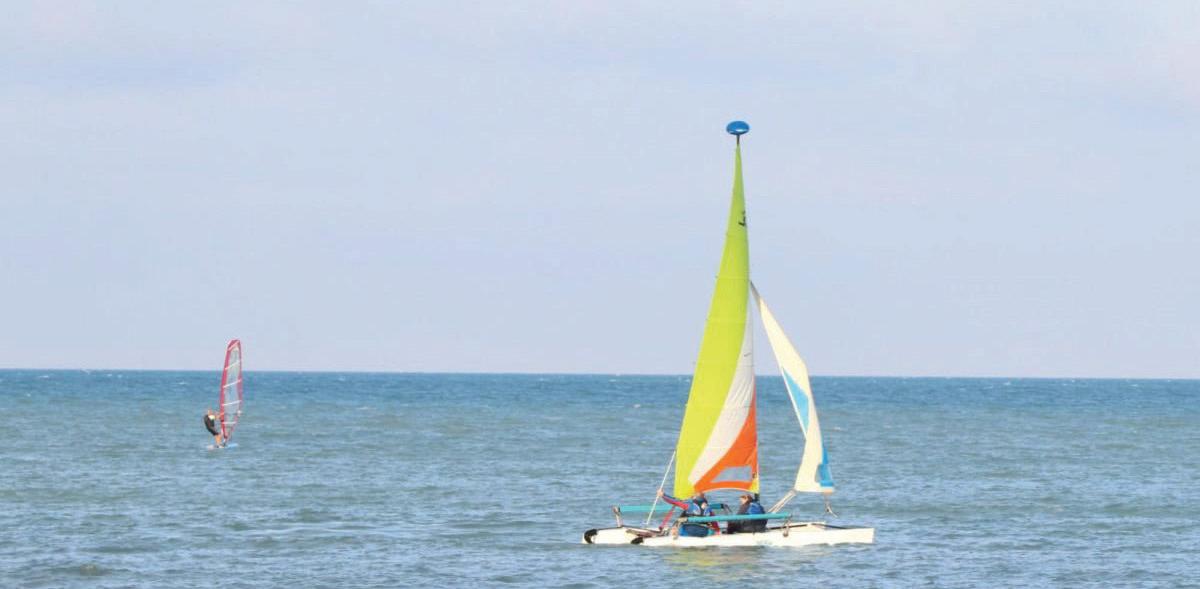
community objected to the policy passed by the council.
Payson Wild, president of the Evanston Sail & Paddle Association, said the organization agrees with most of the board’s proposals, but he described the one-rack-per-household restriction as a “piecemeal solution.”
Wild said the organization would prefer adding more racks to limiting slips per household, but it supports the city’s rental policy with sliding scale payment options, allowing those with lower incomes to access boats without the nancial burden.
Ald. Juan Geracaris (9th), who voted in favor of the proposal, noted that the council had seen “a shi ” in recent years, referencing Ald. Devon Reid’s (8th) proposal in 2022 to make all beaches free to Evanston residents.
A er Reid’s proposal, City Council voted to make beaches free for Evanston residents. Previously, residents paid $8 for a day pass or
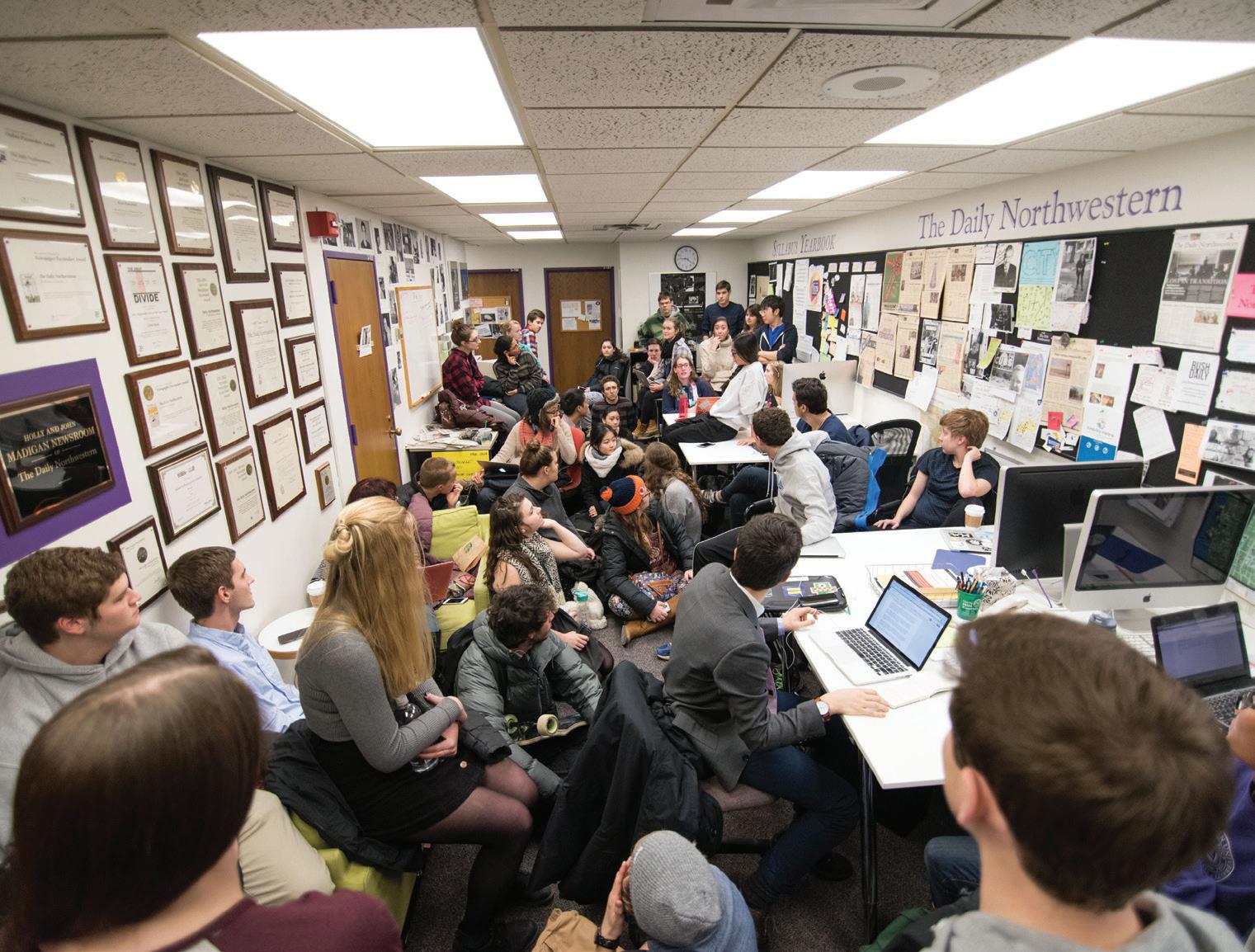
Get real-life experience.
Get real-life journalism experience. In class, you'll learn how to write an event story or produce a video. At The Daily, you'll interview people about actual news and get practice writing for your peers and neighbors. You'll chase stories against the pros and build your skills under deadline. And you'll have fun along the way.
Daily alumni go on to work for major news outlets, including: The NewYork Times, USAToday, Sports Illustrated,TheWashington Post, ESPN,TheWall Street Journal,Deadspin,People, and Vox
Contact us for more information: EMAIL joinus@dailynorthwestern.com OR VISIT dailynorthwestern.com
$18-to-$28 for a season pass. In 2023, the city similarly removed the yearly $75 fee for the Evanston Dog Beach. “We’re commi ed to having all our resources available for everyone,” Geracaris said.
At the April 8 Administration and Public Works Commi ee meeting, members also considered a contract to allow the rental of beach chairs and e-bikes. Again, the conversation addressed equity.
Director of Parks and Recreation Audrey ompson said the Parks and Recreation board did not want to create a “VIP section” where only people who can pay to rent a beach chair could sit. To mitigate these concerns, sta recommended that councilmembers approve a contract that would allow renters to place their chairs and umbrellas anywhere on the beach.
Administration and Public Works approved the proposal, but due to lack of a quorum, City Council won’t consider it until its April 29 meeting.
Later this year, a sliding scale policy will also take e ect, allowing families with lower incomes to access discounts for recreational programs, including boat rentals and other aquatic activities, Carter said.
“When you start pu ing all these programs together and all these li le pieces, it comes together,” he said. “And that’s how we provide equitable access to the lakefront.”
Carter said that, at times, the beach can feel “private,” and he considers it his responsibility to ensure that everybody has access to the public resource.
“ ere’s a spiritual connection with the lake, and I think that just fosters a sense of belonging to nature, and our ecosystem and our connection with other humans,” Carter said. “If we were to diminish that, take that away from people, it’d be detrimental to people’s health.”
hannahwebster2027@u.northwestern.edu
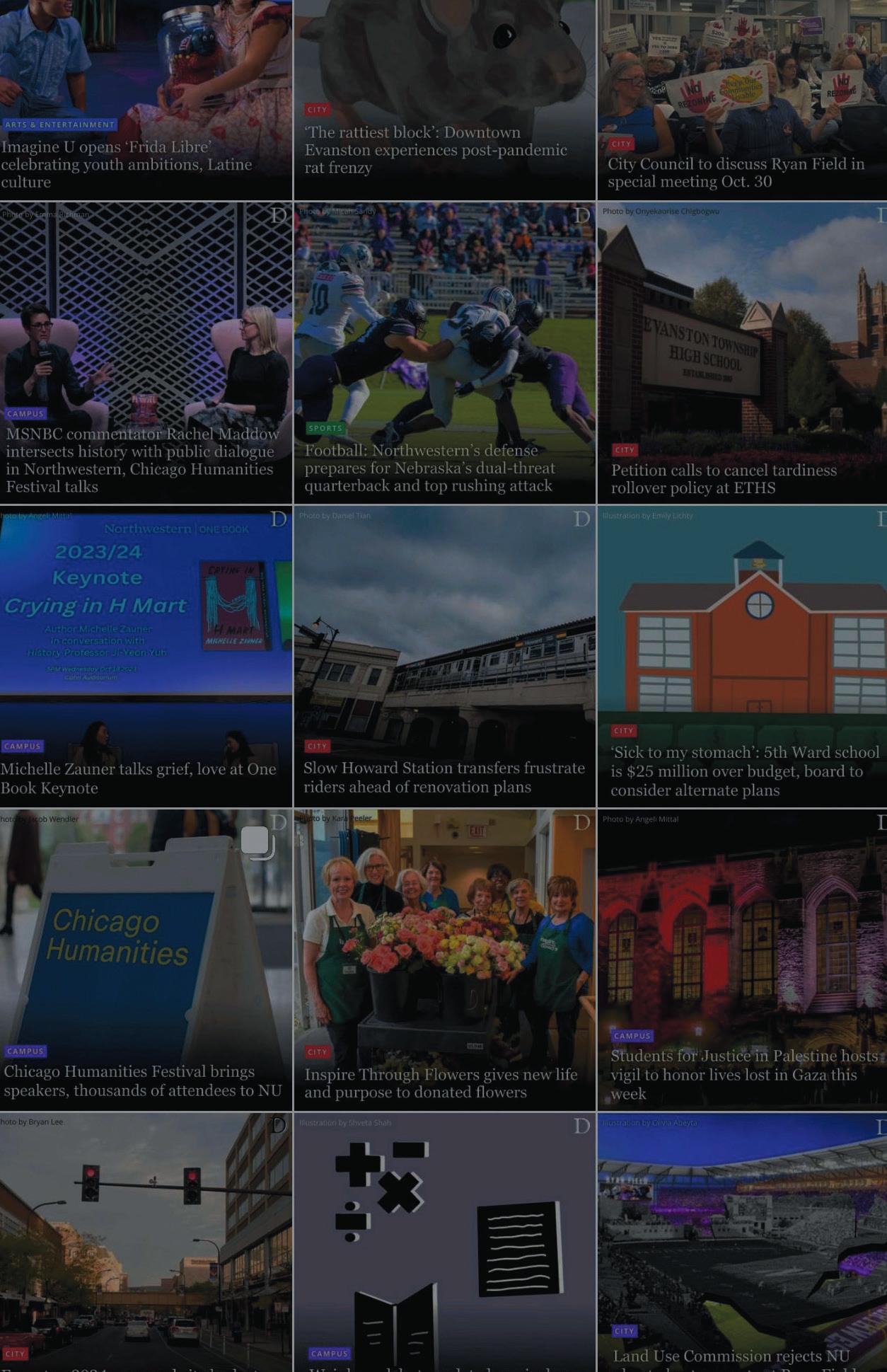



Coach Kelly Amonte Hiller never shied away from forging her own path.
After earning soccer and lacrosse All-American honors at Maryland in the 1990s, she took a chance on a dormant program at Northwestern, which she moved halfway across the country to build from the ground up.
“You see it in football, you see it in basketball, you see it in field hockey — everybody is developing their kids,” Amonte Hiller said. “The key to our success is development.”
Eight national championships, four Tewaaraton Award winners and almost 350 victories later, Amonte Hiller has fortified a dynasty few NCAA powerhouses can parallel. As she chases her record ninth national crown this May, Amonte Hiller’s recruiting acumen will be front and center.
In a collegiate landscape largely dominated by the transfer portal, 10 of 12 Wildcat starters entered the program out of high school. Much like Amonte Hiller, many players left traditional East Coast hotbeds to suit up for the midwestern juggernaut.
“You have to be courageous enough to take a chance, do something different,” Amonte Hiller said. “Obviously, we’re a great program, but it’s still a different choice for some people.”
When she and her staff hit the recruiting trail, they’re not always eyeing blue-chip prospects; Amonte Hiller said she couldn’t care less about the number of stars attached to a recruit’s name. The reigning Intercollegiate Women’s Lacrosse Coaches Association National Coaching Staff of the Year pays recruiting rankings the same attention as national polls — they’re “just someone else’s opinion,” according to Amonte Hiller.
She added that major recruiting lists didn’t include sophomore attacker Madison Taylor in their upper echelon. Taylor now leads all sophomores in the country with a Big Ten-best 77 points in 14 games this season.
For one of the sport’s foremost pioneers, an intangible quality intrigues Amonte Hiller — willpower.
“We really look for that kid that maybe has a bit of that underdog mentality,” Amonte Hiller said. “We pride ourselves on that and people who we feel we can develop. It takes a great attitude to develop. It takes great athleticism, teamwork. There’s a lot of characteristics we look for.”
With a golden generation set to depart NU this summer, a new crop of recruits must help fill their lofty shoes. But, the groundwork for the incoming class of ’Cats began long before last season’s national title run.
More than two years before prospects will don their respective college colors, coaches can begin contacting and offering high school students on Sept. 1 of their junior year.
You have to be courageous enough to take a chance, do something different.
- KELLY AMONTE HILLER ”
Attacker and midfielder Jenna Soto, a Long Island, New York, native, committed to Georgetown Sept. 21, 2022. However, Soto reopened her recruitment just weeks before November 2023’s National Signing Day. And, in stepped the reigning NCAA champions.
“This whole time between me committing to Georgetown up until I committed to Northwestern, I totally changed as an athlete and a person,” Soto said. “I always knew I wanted to achieve above and beyond, but when I really opened my eyes to see how much work and dedication it takes to be a Division I athlete … I was able to realize that I wanted more.”
Akin to Amonte Hiller’s developmental aspirations, assistant coach Scott Hiller spearheaded Soto’s recruitment process on a time-crunch, bookending NU’s 2024 recruiting class with its 11th and final commit.
Four hundred and ten days separated the team’s first and last commitments, embodying Amonte
Hiller’s faith in the process.
“As a recruiter, you have to be diligent and do your homework because if you don’t, it can really hurt,” Amonte Hiller said.
Meshing pieces into a complete group
There’s no player mold that jumps off Amonte Hiller’s evaluation sheet. She said a major teambuilding facet revolves around constructing a cohesive unit packed with abundant archetypes.
“We try to hone in position-by-position and the way we like to coach and play the game,” Amonte Hiller said. “For instance, on the offensive end, you see someone like Erin Coykendall. She’s not as fast as maybe Jane Hansen, but she has this skill set that is just undeniable. It’s a Steph Curry-type situation.”
Player personalities are paramount in sustained success, Amonte Hiller added. On-field ability doesn’t form the quintessential element of a prospect’s potential.
For Soto, the emphasis beyond the game was especially pertinent.
“The other schools are just looking for you to come in and be their superstar lacrosse player, and they never really asked how you are or how your mentality is,” Soto said. “When I went to Northwestern, before they even talked about my lacrosse (ability), they realized how my mentality was … how much I pushed myself.”
Incoming attacker and midfielder Bricín Mahoney said the ’Cats’ 2024 class reflects a sustained effort from NU’s staff to build a complementary group.
A Colorado native, Mahoney helps form a class of players encompassing four different time zones.
“Kelly and the rest of the coaching staff work to get not just great players, but great people and great families,” Mahoney said. “You can tell they really spend the extra time to go after not just those ‘top recruits,’ but they make sure to look at the whole package. … My recruiting class, we instantly
Are they adaptable? How do they seek feedback? That type of stuff is really important to us.
-KELLY AMONTE HILLER ”
clicked the first time we met.”
Amonte Hiller and her staff meticulously analyze film and live action from club and high school games, but she said there’s only so much she can take away from afar.
Away from the jam-packed summer showcase sidelines teetering with scouts, Amonte Hiller said she prefers the hands-on coaching that camps provide.
“Getting to work with kids at camp is a must,” Amonte Hiller said. “You can show a certain way on video, but our next step is to get them out and work with them. We’re very involved in the teaching of the camps, so we can see how coachable they are, how they learn. Are they adaptable? How do they seek feedback? That type of stuff is really important to us.”
While the coaching staff is heavily involved in the school’s summer camps, current players also help direct the high-octane sessions.
Mahoney, who attended an Amonte Hiller camp on the Evanston campus, said she received significant personalized feedback during her recruiting process that stemmed from her camp performance.
‘Want people that want to be here’
When the clock strikes midnight on Sept. 1, the Division I landscape becomes engulfed in a recruiting frenzy. Coaches across the country hastily attempt to land their tier-one prospects, resulting in countless calls, texts and emails.
Both Mahoney and midfielder Hannah Rudolph said they received recruitment videos from an exuberant Amonte Hiller inside Ryan Fieldhouse once their contact windows opened in 2022.
Amonte Hiller said her pace on the recruiting trail depends on specific scenarios, but she and her staff don’t pressure expeditious decisions. She, Hiller and assistant coach Alexis Venechanos serve as primary recruiters, while assistant coach Charlie Leonard also helps throughout the process.
“We want people that want to be here — and want to be here for the right reasons,” Amonte Hiller said. “We want them to really feel without a shadow of a doubt that this is the place for them.”
Some programs utilize commitment deadlines to draw potential recruits to their schools. With this tactic, a coach extends an offer but will only honor the commitment by a designated date. Amonte Hiller said NU doesn’t engage in this practice.
When another program gave Mahoney a deadline, she texted Amonte Hiller and her assistants looking to expedite her campus visit date. Mahoney said Amonte Hiller welcomed her to Evanston “without hesitation” the next day.
“Kelly would never even consider giving you a deadline,” Mahoney said. “She knows that if you want to go to Northwestern, if you know you belong here, you don’t need that extra pressure.”
While Amonte Hiller said the school’s facili-
We want them to really feel without a shadow of a doubt that this is the place for them.
- KELLY AMONTE HILLER ”
ties and campus speak for themselves, she makes sure to take recruits around Evanston and its sur rounding areas. She said she looks to display a small sample of the many possibilities the city has to offer.
Wilmette’s Hotcakes has become the Lake Show’s go-to breakfast spot for its prospective players and their families.
Amonte Hiller said Hotcakes is her “biggest must-hit” restau rant, but she and her staff rotate through a bevy of eateries on tours. Rudolph, who played under Amonte Hiller during the summer and fall with the U.S. U20 Training Team, said her visit left a lasting impression.
“I could really imagine myself being in that facility every day and bettering myself,” Rudolph said of her visit. “She took my dad and (me) to a couple of restaurants, and I’m a big foodie, so she really spoke to my heart.”
Decades of lessons learned and future visions
More than two decades after guid ing the ’Cats from the club level to the nation’s pinnacle, Amonte Hiller boasts bountiful tales from the recruiting trail. She was one of the first coaches to recruit in Texas, landing superstar defender Taylor Thornton. Former goalscoring phenom Selena Lasota came to NU from British Columbia.
Through all the success stories and even her misses, Amonte Hiller said belief in her self has been the biggest lesson along the way.
“I really feel like I have a good instinct on people and the people that would fit within our program and under our leadership,” she said. “Just trusting that — trusting when it’s right and when it’s not right — that’s really the key.”
With more programs emerging every sea son alongside a greater diversity of talent apart from traditional hotbeds, Amonte Hiller lauded the parity the game’s growth has provided. The University of South Florida, Charlotte, Mercyhurst and Rhode Island will each field Division I women’s lacrosse teams for the first time in 2025, while Florida State and Austin Peay will begin play the following season. Amonte Hiller said the new upstart pro grams are “awesome” for the sport.
“There is a spot for everyone, and it doesn’t matter how quickly you got recruited, or what your ranking was,” Amonte Hiller said. “If you’re determined, and you’re willing to learn and work hard, you can do anything you want to do.”
As for the NCAA’s new Name, Image and Likeness policy and the transfer portal, Amonte Hiller said the new wave of college
athletics has certainly seeped into the lacrosse sphere, but she’s focused on driven players who
Everyone’s got their own timing. Just trust that timing and trust in your abilities, and know that you’ll land where you’re supposed to land.
- KELLY AMONTE HILLER ”
want to join her program for the right reasons.
While recruiting continues to evolve each season, Amonte Hiller’s advice to collegiate hopefuls centers around trusting the process.
“Don’t worry about what everyone else is doing,” Amonte Hiller said. “Everyone’s got their own timing. Just trust that timing and trust in your abilities, and know that you’ll land where you’re supposed to land.”
jacobepstein2026@u.northwestern.edu
